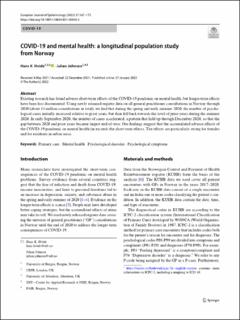COVID-19 and mental health: a longitudinal population study from Norway
Journal article, Peer reviewed
Published version

Åpne
Permanent lenke
https://hdl.handle.net/11250/3060917Utgivelsesdato
2022Metadata
Vis full innførselSamlinger
- Department of Economics [287]
- Registrations from Cristin [9489]
Originalversjon
European Journal of Epidemiology (EJE). 2022, 37 (2), 167-172. 10.1007/s10654-021-00836-3Sammendrag
Existing research has found adverse short-term effects of the COVID-19 pandemic on mental health, but longer-term effects have been less documented. Using newly released register data on all general practitioner consultations in Norway through 2020 (about 14 million consultations in total), we find that during the spring and early summer 2020, the number of psychological cases initially increased relative to prior years, but then fell back towards the level of prior years during the summer 2020. In early September 2020, the number of cases accelerated, a pattern that held up through December 2020, so that the gap between 2020 and prior years became largest end-of-year. Our findings suggest that the accumulated adverse effects of the COVID-19 pandemic on mental health far exceeds the short-term effects. The effects are particularly strong for females and for residents in urban areas.
